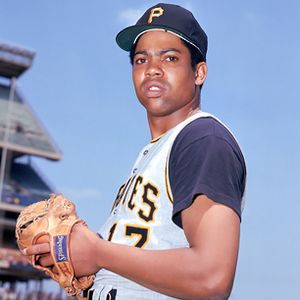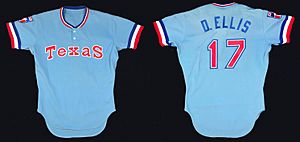Dock Ellis facts for kids
Quick facts for kids Dock Ellis |
|||
|---|---|---|---|

Ellis with the Pirates
|
|||
| Pitcher | |||
| Born: March 11, 1945 Los Angeles, California, US |
|||
| Died: December 19, 2008 (aged 63) Los Angeles, California, US |
|||
|
|||
| debut | |||
| June 18, 1968, for the Pittsburgh Pirates | |||
| Last appearance | |||
| September 29, 1979, for the Pittsburgh Pirates | |||
| MLB statistics | |||
| Win–loss record | 138–119 | ||
| Earned run average | 3.46 | ||
| Strikeouts | 1,136 | ||
| Teams | |||
|
|||
| Career highlights and awards | |||
|
|||
Dock Phillip Ellis Jr. (March 11, 1945 – December 19, 2008) was a professional baseball player from the United States. He was a right-handed pitcher in Major League Baseball (MLB) from 1968 to 1979. He is best known for playing with the Pittsburgh Pirates.
With the Pirates, Ellis helped his team win five National League Eastern Division titles. This happened over six years, from 1970 to 1975. He also helped them win the World Series in 1971. Ellis also played for the New York Yankees, Oakland Athletics, Texas Rangers, and New York Mets.
In his MLB career, Ellis had a record of 138 wins and 119 losses. His earned run average (ERA) was 3.46, and he had 1,136 strikeouts. He was the starting pitcher for the National League in the All-Star Game in 1971. That same year, the Pirates won the World Series.
When he joined the Yankees in 1976, he helped them win the American League pennant. He was also named the league's American League Comeback Player of the Year. Ellis was known for speaking up for players' rights. He also supported the rights of African Americans. He passed away in 2008 at age 63.
Contents
Early Life and Baseball Beginnings
Dock Ellis was born in Los Angeles, California. He went to Gardena High School in Gardena. While there, he played for the school's basketball team. He even set a school record with 21 assists in one game.
Ellis also played baseball as an infielder for a local semi-professional team. This team was called the Pittsburgh Pirates Rookies. Many future major league players were on this team with him. After high school, Ellis attended Los Angeles Harbor College.
At age 17, Ellis was diagnosed with sickle cell trait. This is a condition that affects red blood cells.
Playing Career Highlights
Minor League Years (1964–1968)
While in college, many MLB teams wanted to sign Ellis. He waited for an offer from the Pittsburgh Pirates. He heard they gave out large signing bonuses. In 1964, Ellis started playing for the Batavia Pirates. This was a Class A team.
The next year, he played for the Kinston Eagles and the Columbus Jets. In 1966, Ellis played for the Asheville Tourists. He had a 10–9 record and a 2.77 ERA. He was even named an All-Star. The Pirates called him up to the major leagues that year, but he didn't play in a game.
In 1967, Ellis felt he was not on the major league team because of how many African American players they already had. He also believed he was sent to a lower league because of his long hair. He said he was promoted back after cutting his hair.
Pittsburgh Pirates Years
Ellis made his MLB debut in June 1968. He started as a relief pitcher. Soon, the Pirates moved him to the starting rotation. He finished 1968 with a 6–5 record and a 2.51 ERA. In 1969, he became a regular starter for the team.
No-Hitter in 1970
On June 12, 1970, Dock Ellis pitched a no-hitter against the San Diego Padres. This means no Padres player got a hit off him. The Pirates won the game 2-0. It was the first game of a doubleheader.
Ellis walked eight batters and struck out six. His teammates, Bill Mazeroski and Matty Alou, made great plays to help him.
Success and World Series (1970–1972)
Ellis finished 1970 with a 13–10 record. He had some elbow and shoulder pain. The Pirates won the National League East division. Ellis started Game 1 of the 1970 National League Championship Series (NLCS). The Pirates lost the series to the Cincinnati Reds.
In 1971, Ellis became the Pirates' Opening Day starting pitcher. He had a great start to the season, with a 13–3 record. This earned him a spot in the 1971 Major League Baseball All-Star Game. He was chosen to start the game, which was a big honor.
During the All-Star Game, Reggie Jackson hit a very long home run off Ellis. Later, Ellis started Game 2 of the 1971 NLCS and won. He also started Game 1 of the 1971 World Series against the Baltimore Orioles. He struggled in that game due to elbow pain. However, the Pirates went on to win the World Series in seven games!
Ellis finished 1971 with a 19–9 record and a 3.06 ERA. He was one of the best pitchers in the league. In 1972, the Pirates won the NL East again. Ellis had a 2.70 ERA. The Pirates faced the Reds in the 1972 NLCS but lost.
Challenging Years (1973–1975)
In 1973, Ellis missed part of the season with elbow pain. The Pirates lost their division title.
On May 1, 1974, Ellis had a memorable game against the Cincinnati Reds. He was frustrated and threw pitches that were very close to the batters. He hit three batters in the first inning. His manager, Danny Murtaugh, took him out of the game.
Ellis struggled early in 1974. But then he won eight games in a row. His season ended early when a hard-hit ball fractured his pitching hand. The Pirates won the NL East but lost the 1974 NLCS.
In 1975, Ellis had disagreements with his team's management. This led to a suspension. He finished the season with an 8-9 record. The Pirates won the NL East again but were swept by the Reds in the 1975 NLCS.
New York Yankees (1976)
After the 1975 season, Ellis was traded to the New York Yankees. He had a great year in 1976, with a 17–8 record and a 3.15 ERA. He was named the AL Comeback Player of the Year.
The Yankees won their division in 1976. Ellis helped them reach the 1976 World Series. He started Game 3, but the Yankees lost the series to the Reds.
Oakland Athletics and Texas Rangers (1977–1979)
Before the 1977 season, Ellis was traded to the Oakland Athletics. He had a strong personality. Once, when asked to keep charts, he famously set them on fire in the clubhouse, accidentally setting off sprinklers.
In June 1977, the Texas Rangers bought Ellis from the Athletics. He had a good second half of the 1977 season. In 1978, Ellis disagreed with his manager's strict rules. The Rangers eventually fired the manager.
New York Mets and Return to Pittsburgh (1979)
In June 1979, Ellis was traded to the New York Mets. He pitched for them for a few months.
Ellis then asked to return to the Pirates. The Pirates bought him back in September 1979. He made three relief appearances for them that year. After the season, he retired from baseball. He finished his career with a 138–119 record and a 3.46 ERA.
Pitching Style
Ellis had five different pitches: a fastball, a curveball, a changeup, a palmball, and a "sliding fastball." He trusted his catcher to call the pitches.
He also kept a special notebook called "The Book." It had detailed information about each hitter's strengths and weaknesses. He often asked other famous pitchers for advice.
Life After Baseball
Ellis retired from baseball in 1980. He said he had lost interest in playing.
He became a counselor in California. He also counseled prisoners. In the 1980s, the Yankees hired Ellis to work with their minor league players. He even appeared in the 1986 movie Gung Ho.
In 1989, Ellis played and coached for the St. Petersburg Pelicans. He continued to play in a local league in Los Angeles. In 1999, he was honored by being inducted into the Baseball Reliquary's Shrine of the Eternals.
In 2007, Ellis was diagnosed with a liver condition. Friends from his baseball career helped pay his medical bills. Dock Ellis passed away on December 19, 2008, at age 63. His life was featured in a 2014 documentary film called No No: A Dockumentary.
See also
- List of Major League Baseball no-hitters
Images for kids



